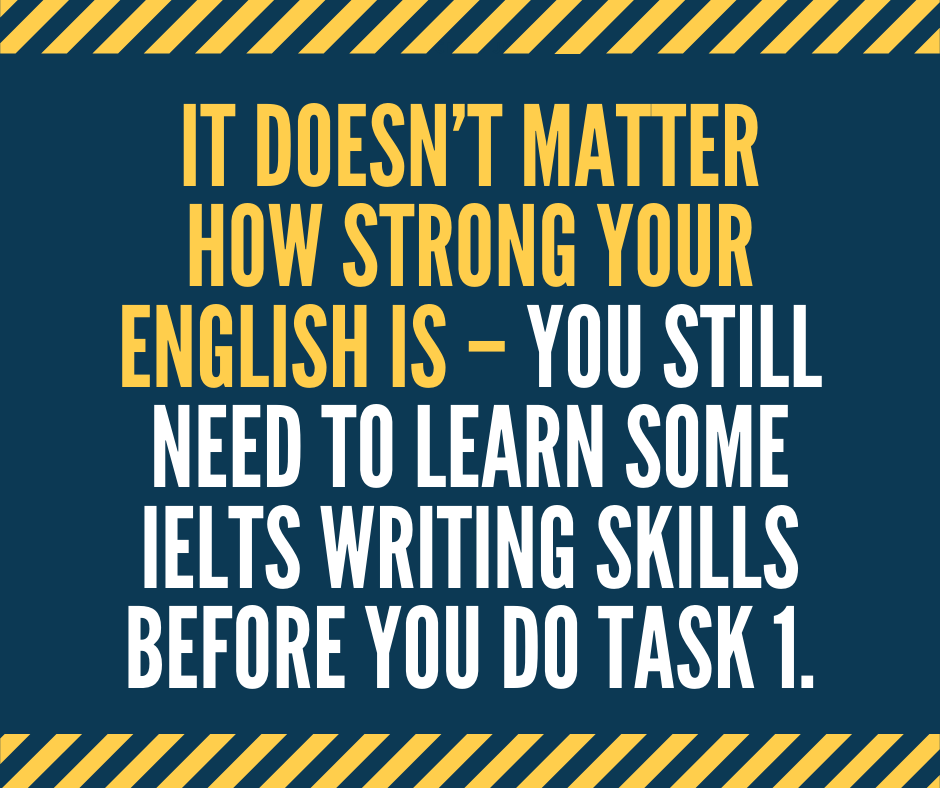IELTS Writing Task 1: Everything You Need to Know
IELTS Writing Task 1 asks you to write a summary of at least 150 words about some visual information, usually in the form of a graph, chart, or diagram. You must select the main features and describe and compare the data.
If you’re taking Academic IELTS, you’ll be required to write a report on a data set, map or process in Writing Task 1. In this video, I’ll show you how to give the examiner exactly what they want in 6 simple steps.
Academic Writing Task 1 Strategy
- Understand how the test is marked.
Knowing the marking criteria will allow you to give the examiner exactly what they need. - Paraphrase the question.
It is best to paraphrase the question in the first paragraph. You can do this by using synonyms. - Write the overview.
To write your overview, pick 3 or 4 of the main features and write about them generally without referencing any data. - Support the main features.
In a new paragraph, support the key features with the data in the information given to you. - Check your work.
Check your report for spelling and grammar mistakes. Make sure that the data you mentioned is also accurate!

Essential Writing Task 1 Skills
- How to Write an Overview Paragraph
- How to Paraphrase
- How to Write a Complex Sentence
- How Many Words?
Around 150 words? Exactly 150 words or over 150 words? How many words over? How do I know how many words I have? This article answers all those questions and more.
This quick checklist can be used for any Task 1 question and help you ensure you have everything you need to get your best possible score.
Here is a list of all the tips I give my students doing Task 1.
Synonyms are very important…However, they can also really reduce your mark if used incorrectly.
The six most common mistakes that stop students from getting over a Band 6.
This article will show you how to make your writing as clear and as easy to read as possible. It will also advise you on whether to use a pen or pencil.

Writing Task 1 Full Lessons
Task 1 certainly can seem difficult if you haven’t seen it before. This lesson breaks the question down into 5 easy-to-understand steps.
Charts are probably the most common Task 1 question, so in this post, we will show you what data to choose and how to describe it.
Maps are not very common, but they are the easiest (in my humble opinion). Therefore, if you don’t learn how to do them, you could really regret it if one appears in your exam.
What should you do if you get two different charts or graphs? This lesson shows you how.
Sometimes you will be shown a process, such as a life cycle or how something is manufactured. This certainly requires a very specific approach – you can learn what it is in this article.

Academic Task 1 Sample Answers

You must have some good IELTS samples to compare your writing and see if you are at your required level.
- Bar Chart Sample Essay (Cars in Asia)
- Process- Cement and Concrete Production
- Pie Chart (Italy and Yemen Populations)
- Process Question
- Bar Chart Question (UK Telephone Usage)
- Line Graph (US Consumption of Energy)
- Bar Chart Sample Answer (International Students)
General Training Writing Task 1
In IELTS General Training, you must know how to give the examiner what they want. Therefore, you must understand whether you should write a formal or informal letter.
The downloadable PDF below will teach you everything you need to know about formal and informal letters, including a step-by-step strategy for scoring a Band 7 or above.

General Training Writing Task 1 in 5 Simple Steps
- Understand how the test is marked.
Knowing the marking criteria is the best way of giving the examiner exactly what they need and nothing else. - Decide whether the letter is formal or informal.
This part is easy. If the question asks you to write to a ‘friend’, it should be an informal letter. If the question asks you to write to anyone else, it should be a formal letter. It is that simple! - Discuss each bullet point from the question.
Make sure to take a new paragraph for each bullet point. This will make your letter easy to read and understand. - Sign off your letter.
Don’t overcomplicate this part. Include a sign-off suitable to your letter’s tone and write your name beneath. - Check your work.
Make sure your letter doesn’t contain any grammar or vocabulary mistakes.
Essential Writing Task 1 Skills
This article will outline important guidelines you must follow to write a high-scoring letter in IELTS Writing Task 1.
You must write your letter in the correct tone. Therefore, this post will show you how to write an informal letter that will boost your score in IELTS Writing.
Many people worry about writing in a formal tone. However, this post will show you how simple it can be to use formal language and get the score you need in IELTS Writing Task 1.
General Training Essential Writing Task 1 Skills
Do you know what a Band 7+ letter looks like? This post will share a strong IELTS sample letter alongside a foolproof strategy so that you can write your own.
This guide will teach you exactly how to write a Band 7+ Task 1 letter, including formal vs informal letters, common mistakes to avoid and a structure you can follow from home.
Sample Answers
You must have some good IELTS samples so that you can compare your writing and see if you are at your required level:
Writing Task 1 Essential Information
These facts will help you understand what the test is and how it is scored so that you can move on to improving your performance.
- People doing the Academic test will write a report on a data set, map, or process. People doing General Training will write a letter.
- You must write 150 words or more.
- You should spend around 20 minutes on this part of the test.
- Task 1 is worth 1/3 of your total mark on the Writing test.
- You will be assessed in four areas:
Task Achievement (25%)
Coherence and Cohesion (25%)
Lexical Resource (25%)
Grammatical Range and Accuracy (25%) - The most important thing is that you can demonstrate that you can clearly communicate in English.
- The key to doing well is to know exactly what the examiners want and give it to them.
However, try not to worry about these small details. Instead, you should focus on what really matters – improving your performance.
Grammar and Vocabulary Guide

Grammar and vocabulary combined account for 50% of your score in IELTS Writing Task 1. Therefore, you must find your common grammar and vocabulary mistakes and then fix them. In my experience, this is the best way to boost your score in these exam sections.
This post will show you the specific grammar structures and phrases you need to score high in IELTS Writing Task 1.
I have found some common grammar mistakes after marking thousands of tests.
See the interactive tool below for the most commonly asked questions we receive about IELTS Writing Task 1:
IELTS Writing Task 1 FAQs
How can I improve my writing?
You will find all the resources you need on our Writing Task 1 page. Click the link below:
If you need serious help or personalised feedback, you should check out our online course. There is a waiting list, but you can add your name here:
How can I get a Band 7, 8 or 9?
The answer to this question is different for every individual IELTS student, as it depends on a number of factors, including your work ethic, English skills and exam strategy. You'll find a guide to answering this question in this article
If you need serious help with improving your IELTS scores, you should check out our online writing course. There is a waiting list, but you can add your name by clicking the link below:
Can you correct my writing?
Sure!
Please click the link below and it will give you all the information you need about our writing correction service:
Do you have any sample answers?
Yes, you will find them at the link below:
Will using 'high level' or 'academic' words help me improve my score?
Probably not.
Read my recent article about IELTS vocabulary here:
How many paragraphs should I write?
Four:
Introduction
Overview
Details 1
Details 2
You can put the overview at the end if you'd like.
Can I use idioms?
No, you should typically avoid using idioms in Writing Task 1.
The only time this is acceptable is if you are taking the General Training test and must write an informal letter.
Should I write a conclusion for Task 1 Academic?
No. A conclusion is a summary of YOUR ideas and your opinion. Task 1 is simply reporting what you see, so there shouldn't be any of your ideas or your opinion.
Instead of a conclusion, you should write an overview.
The reason lots of people get confused about this is that some teachers, books and even one British Council website call the overview a 'conclusion'. It's not a conclusion, it's an overview.
Finally, it does not matter where you put the overview paragraph. We teach our students to put it after the introduction, but it is also fine to have it as your final paragraph.
How many words should I write?
You must write at least 150 words in Writing Task 1 (yes, the examiners will count them!)
I would suggest that you aim to write around 160-170 words for Task 1. Aiming for 20-30 words more than the required amount makes you more likely to reach the word limit without setting an unrealistic goal.
Will I lose marks if I don't write enough words?
Yes. If you don't write the required number of words, you will lose marks in 'Task Achievement' for not answering the question fully. Read more here.
Can I use contractions?
No, should not use contractions when you are writing an academic essay or formal letter. However, it is fine to use contractions in an informal letter.
When should I write formally?
There are a few signposts that indicate when you should write formally or informally. Watch our video lesson to find out what they are:
IELTS Writing Task 1 General Training: Formal or Informal Letters?
